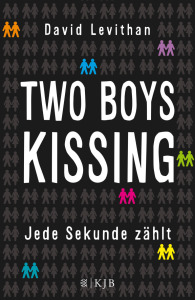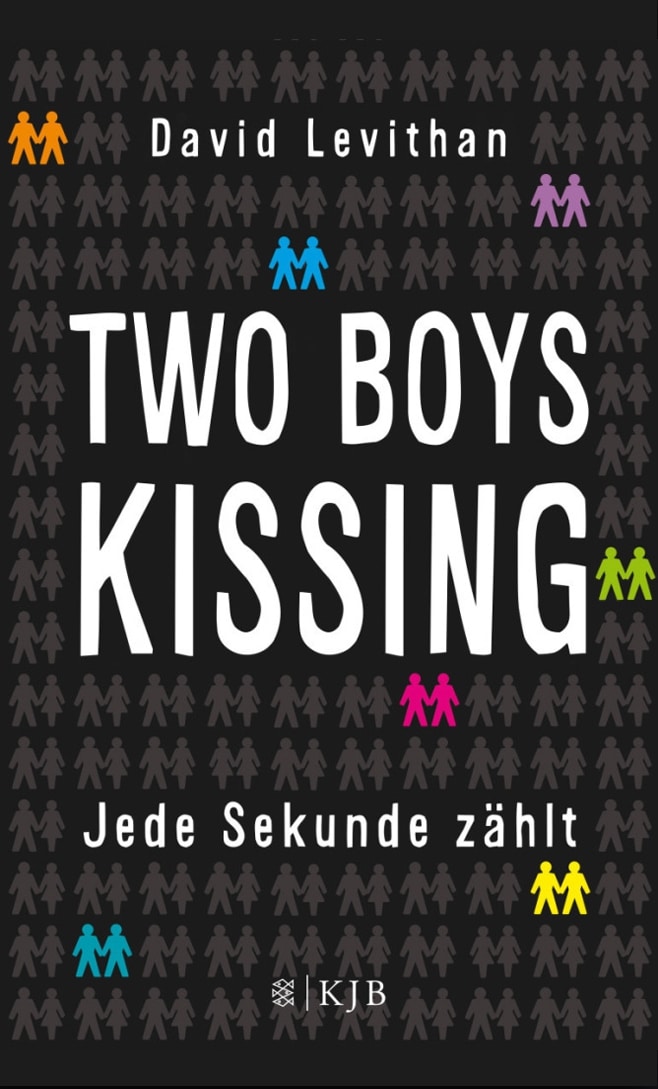One of the best gay books of recent years: in his coming-out novel "Two Boys Kissing - Every Second Counts", David Levithan builds a bridge from the Aids generation of the 1980s to queer young people of the present day.
Haven't all the variations of the gay coming-out story been told by now? The question can undoubtedly be asked, especially if you have long since left this phase of your life behind you. David Levithan provides the answer. You just want to smooch him for his new novel "Two Boys Kissing - Every Second Counts", and you can confidently make any bet: This book is here to stay. It will by no means only delight teenagers. It will become a longseller and school reading and find its firm place in the canon of young adult literature. There's no doubt about it: all subsequent coming-out novels will have to be measured against "Two Boys Kissing".
Too much laurels and praise? Not at all. Rarely has it been possible to recommend a book so unreservedly, or rather, to recommend it to the heart. But first things first.
Be grateful!
On the first few pages, US author Levithan, born in 1972, causes some irritation. He quickly jumps back and forth between his settings and introduces a dozen or so protagonists, all gay teenagers, in a flash.
There is Cooper, for example, who seems to live out his gayness only virtually, but all the more fiercely on the dating platforms, without really finding himself. Avery (dyed blue hair) and trans boy Ryan (dyed pink hair) meet at an LGBT party.
Tariq was beaten up for being gay and is suffering the consequences. Neil and Peter are not yet allowed to spend the night together, but apart from that their parents are pretty cool about the fact that they are a couple.
And in between, a narrator's voice that cannot be categorised at all. It speaks to us, the readers, or to the characters, in a serene, almost unctuous way: "You can't know what it's like for us now - you'll always be one step behind. Be grateful for that. You can't know what it was like for us then - you'll always be one step ahead. Be grateful for that too."
Stories from a bird's eye view
And as the various stories of the young main characters slowly crystallise, the mystery of who is watching the whole event from a bird's eye view, so to speak, and who sometimes wants to intervene, help or comfort them, is also solved.
This "we" that is speaking is the generation of men who discovered their gayness many years before these young people. They are the voices of the dead who mastered their coming out in the 80s and 90s under completely different circumstances and yet lived through very similar feelings, problems and struggles.
This we draws comparisons and thus describes the progress and changes in gay life: "We didn't have the internet, but we had a network. We didn't have websites, but there were places where we wove our networks."
Yesterday's generation has many experiences ahead of today's young people - experiences that everyone has to go through anew, sometimes even suffer through: falling in love unhappily, being teased for being gay, being laughed at, even being rejected by parents. To be deceived and hurt by a lover; to not find the courage to approach someone else.
"A new funeral every day."
And then there are the experiences that the narrators hope others will be spared forever: "A new funeral every day. How much space that took up in our lives. Imagine if a pupil died every day at your school. Some are friends of yours, others simply classmates. You keep going because you know you have no other choice. You become the bearer of memories, and the bearer of grief, until finally it is you who is gone and mourned."

This choir of narrators accompanies the young people. And David Levithan arranges and composes the parallel fates and stories in a dramaturgically extremely skilful and exciting way. Until they are all linked to a central event: a world record attempt.
The record kiss
Craig and Harry want to break the all-time kissing record. They have to hold out for at least 32 hours, 12 minutes and 10 seconds. The couple have only just split up, but they want to set an example together with their campaign: against homophobia and in favour of the acceptance of homosexuality.
Incidentally, this record-breaking kiss actually happened, albeit under different circumstances and exactly 35 seconds longer, but no less spectacular. Two students at the College of New Jersey made it into the Guinness Book of Records in 2010.
In Levithan's novel, the action triggers enthusiasm, widespread support, great media interest, but also homophobic attacks. And the kiss also changes Craig and Harry's feelings for each other and affects almost all the characters in the novel in one way or another.
And while an ever-growing crowd gathers to cheer on the couple during the countdown, the other protagonists also experience decisive developments.
Complex panorama
Levithan not only unfolds a complex panorama of the feelings and developmental stages of these gay teenagers. He also portrays the whole range of reactions from society, family and friends. Sounds overambitious and overconstructed? And yet it reads quite differently: enlightening and touching, and thanks to the simple but elegant language (also in the German translation) truthful without sinking into kitsch.
Last but not least, Levithan manages to make your eyes moist with happiness and emotion, and because he repeatedly succeeds in expressing human truths in simple sentences in a heart-warming way.
David Levithan "Two Boys Kissing - Every Second Counts". Translated from the American by Martina Tichy. S. Fischer publishing house, 288 pages, hardcover, 14,99 Euro











